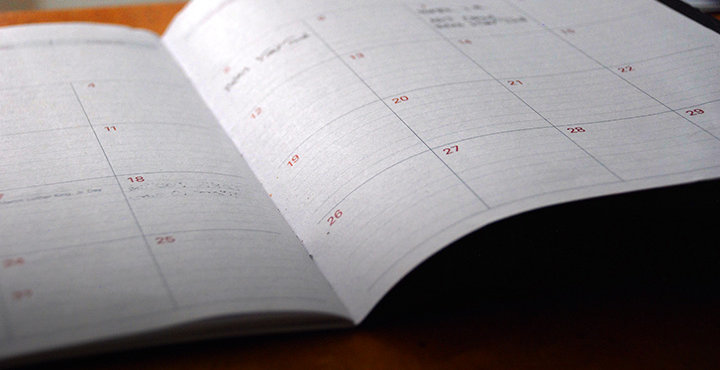Follow these 10 helpful tips to manage your time more effectively
There is no shortage of books available that offer time management techniques, but books take time to read. Time you don't have! Scribendi.com understands that, so we have compiled a quick list of time management techniques that will help you manage your time more effectively.
1. Keep a clock on your wall that only you can see
This is a great time-saving technique and will keep your meetings brief. As your first year student is tearfully explaining that he won't get his term paper done on time because he's working three jobs in order to raise money for his Grandma's poodle's operation (cough, Spring Break in Cancun, cough), you can discreetly keep your eye on the time. When it verges on ten minutes of canine genealogy, you can smile politely, offer him a tissue, usher him towards the door, and ask him to send you an email while you think it over.
2. Stand up
When an unexpected student or kooky faculty member swings by your office to talk about whatever, remain standing as you talk. When you stand up to greet the time thief with a polite handshake, just "forget" to sit down. Don't cross your arms, but instead stand with feet shoulder length apart, and hands at your side. This is a psychologically assertive yet neutral stance that prevents the would-be intruder from feeling too comfortable. Keep your comments short. Believe me, they will get the hint in a hurry. This time management technique will help to reduce pointless conversations from forty-five minutes to less than five.
3. Use your grad students
Your graduate students need you. They need you to write letters of reference for jobs or PhD programs, sit on their thesis committee, or look over grant proposals. A good time management technique is to make them earn your favor. Send the majority of undergrad complaints their way and have the grad students complete most of the marking. If they're going on to or are already in PhD studies, it's good training. Yo'’re doing them a favor. If they're not, well, it's part of being a grad student. Just make sure to treat them nicely—maybe buy a pizza during midterm marking or occasionally meet them at the pub and buy a round.
4. Email
Experts suggest that you should only check your email twice a day. These "experts" are clearly not living in the 21st century, where BlackBerrys, iPhones, and Wi-Fi have made the suggestion antiquated and unrealistic. The solution is to prioritize your emails. Once a day, allocate half an hour to answering undergrad and graduate student emails. In addition, send out mass emails. If you're getting multiple emails from a single class, it's likely that other people have similar questions. Answer all of them in a single email and hit send. Of course, if you get an email from your lab assistant saying that your AI experiments are a success and your robot is now suddenly demanding to know why it feels, don't wait until the designated time to respond. Send a quick email saying that you'll be right there!
5. Scheduling
Scheduling sets you free. A good time management technique is to schedule everything. Schedule what time you get to the office, time for physical fitness, free time, downtime, and research time. Schedule blocks of time that you can use to accommodate random drop-ins, so when someone asks you if you have a minute, you can say, "For you Brad, I’ve got five. Except not now. Why don’t you drop by my office in an hour and we’ll talk then?"
6. Cram
This is something students are told not to do, because frankly, it doesn’t work—for them. For academics, cramming is essential. Cram all your work—classes, meetings, office hours—into as few days as possible. This has a couple of outcomes. You get to spend more time at home where you can research, write, and be with your family. If you have a 1:00 p.m. class that goes until 3:00, consider trying to get a night class in there as well. This way you can have your office hours in the middle of the day and have a couple hours of uninterrupted researching and writing.
7. Do it once, do it right
Nothing fancy here. The main point is when something comes across your desk or inbox, a good time management technique is to deal with it right away. Someone asks you to look over their latest journal article, say yes or no. If you say yes, get it out of the way, but do a good job. Nothing wastes more time than a job that is not done correctly the first time.
8. Many hands make light work
This is becoming quite common. From what we see at Scribendi.com, scientific research is likely to be collaborative, but we're starting to see more collaborative research in the arts and humanities as well. A good time management technique is to consider collaborating with other faculty members on your research. As a graduate student, I was able to help out in three different research projects and wrote some research proposals. These projects were very diverse; the only thing they had in common was that there were multiple professors handling different aspects of the projects. Some were even from different faculties or departments within the university. Not only is this a good time management technique, it is also a fantastic, efficient, and quick way to beef up your CV.
9. Say no
This is perhaps the most difficult skill to learn. We all want to be liked, and for some reason, we equate likeability with compliance. Let me reassure you that people will still like you if you politely decline once in a while. The big lesson to learn here is that not everything needs to be done by you. There are other people in your department or faculty that are equally qualified. Sometimes, a task that is tedious for you is exciting for someone else. Someone might joyfully take to the task that you begrudgingly accept because you cannot say no. Learn to say no.
10. Say no
Seriously, learn to say no. This may be the best time management technique. If you are running short on time, or want a fresh pair of eyes to review your document, try our academic editing services today.
Image source: endlesswatts/Pixabay.com








